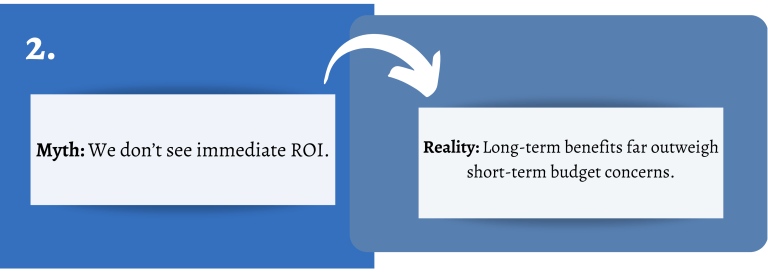18 April 2023

Misconceptions you might hear from decision-makers and the realities you can use to get your transformation back on track.
Transformation continues to be a hot topic across every industry—but no one is feeling the heat more than finance and accounting teams. Priorities have shifted in recent years due to rapidly changing business conditions. Momentum for transformation in the office of the CFO may have slowed or even stalled out completely. You may be wondering how you can restate your case and reignite your initiatives.
Here are a few of the misconceptions you might hear from decision-makers and the realities you can use to get your transformation back on track:

If disruptive events have taught us anything about the workplace, it’s that transformation is more important than ever. Relying on common office software and disconnected systems has made meeting deadlines, keeping everyone on the same page, and even completing some basic tasks challenging. If that’s not a signal for change, what is?
With continued volatility, kick-starting transformation is key to not getting stuck again. And many forward-thinking CFOs agree. According to PwC’s CFO Pulse Survey, nearly half of those surveyed plan to accelerate digital transformation to drive standardization and automation as a way to remain resilient.

While cost is always a consideration, analysts at Gartner counter that successful finance transformations identify future business needs and the corresponding services finance will be able to deliver. Unsuccessful efforts base their transformation on hitting a cost target instead.
Newfound efficiencies within the finance department mean more time for improved analysis and strategic thinking. You might be paying your analysts a lot of money only to have them drilling into data and spinning up pivot tables. Unleash them on value-added activities instead.

Big, pricey ERPs gave the tools of transformation a bad name. But technology continues to change rapidly, making transformation more and more ubiquitous.
Cloud technologies now rival the power once only held by on-premises systems—and at a fraction of the cost. Plus, the increasing number of APIs and integrations have broken down the barriers between systems of record and systems of work. That means the same data and powerful applications are more accessible to larger numbers of people, regardless of location. This is helping create real results for teams. In fact, one finance and accounting team reduced their routine workload by 30% to 40% using software as a part of their finance transformation strategy.

Archaic ways of working haven’t kept up with new demands: a hybrid workforce, new internal control vulnerabilities, or constant reforecasting, just to name a few. Trying to retrofit software built for the lowest common denominator does a disservice to an increasingly distributed finance team hungry for more data, more control, and more context.
Even if conditions begin to normalize, those underlying problems will still exist. There’s a deluge of data to deal with. There are pressures for more frequent and more varieties of reporting. That’s not to mention the recruiting factor. A new wave of workers is coming—and they will take their talents to places that provide the best tools and put them in the best position to succeed.

If you were to try to take everything on at once, sure, finance transformation does seem intimidating. But iterative steps and point solutions can help you cover a lot of ground quickly without significant disruption to your workflow.
Focus on fixable areas first, watch the benefits unfold, and move on to the next area of improvement. According to IMA® (Institute of Management Accountants), an agile approach to finance transformation that focuses on this type of continuous improvement has several benefits, including being able to quickly respond to change and provide timely insights: “The agile finance function can realize elevated outcomes, maximized value, and expedited delivery, enabling their organizations to adapt to changing priorities with agility and data-backed insights. The future of the finance function will be shaped by the success of the transformation underway.”
For more information, please visit workiva.com/sg/.





